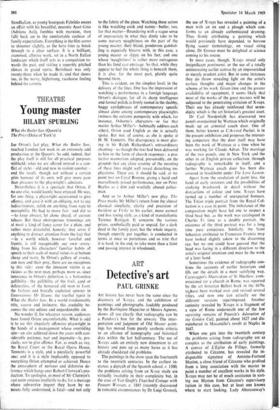THEATRE
Young master
HILARY SPURLING
Joe Orton's last play, What the Butler Saw. reached London last week in an extremely odd production at the Queen's. So odd, indeed, that the play itself is still for all practical purposes withheld; what we are offered instead is a con- flict of styles—old and new in violent combat— and the result, though not without a certain grim humour of its own, will give more pain than pleasure to the playwright's admirers.
Nevertheless it is a spectacle that Orton, if no one else, would keenly have enjoyed. He was, for one thing, a playwright accustomed to give offence, and gave it with an obliging, not to say indiscriminate, relish on anything from rape to necrophilia. He had to move fast —and did so —to keep abreast, let alone ahead, of current taboos. But these obstreperous trimmings are at most a kind of fancy cover for a plain, and rather more distasteful, honesty; they serve if anything to distract attention from the fact that —in a world which, however fanciful and frantic, is still recognisably our own—every- thing from his characters' familiar habits of speech to their scale of moral values is at bottom cheap and nasty. In Orion's gallery of crooks, con men and their prey, there are no exceptions to this rule: even the innocent victim is as vicious as the next man, perhaps more so, since innocence in Orton's definition is a bottomless gullibility—the gullibility of the frail, aged or defenceless, of the bereaved old man in Loot, the forlorn and brutally exploited spinster in Entertaining Mr Sloane, the trustful typist in What the Butler Saw. In a world irredeemably trite, coarse and insincere, this credulity be- comes the one odious and unpardonable sin.
No wonder if, for whatever reason, audiences have found Orton uncomfortable. What is odd is to see this singularly offensive playwright in the hands of a management whose overriding aim—an aim achieved down the years with con- siderable patience, tact and ingenuity—is, pre- cisely, not to give offence. For, as much as, say, the Royal Court or the Royal Opera House, Tennents is a style, and a peculiarly powerful one; and it is a style implacably opposed to everything Orton attempted or achieved. Hence the atmosphere of nervous and defensive de- ference which hangs over Robert Chetwyst's pro- duction. To apologise, as most of Mr Chetwyn's cast seem anxious implicitly to do, for a message whose subversive import they have by no Ineans fully understood, is fatal—and not only to the fabric of the piece. Watching these actors is like watching cook and nanny—butler, too, for that matter—floundering with a vague sense of impropriety in what they dimly take to be some nursery naughtiness on the part of the young master; their bland, ponderous gambol- ling is especially bizarre with, in this case, a young master so slippy on his feet, and one whose 'naughtiness' is rather more outrageous than his fond cast envisage. So that, while they appear to feel the whole thing is beneath them, it is also, for the most part, plainly quite beyond them.
This is evident, on the simplest level, in the delivery of the lines. One has the impression of watching a performance in a foreign language. Orton's dialogue, for all its sharp intelligence and formal polish, is firmly rooted in the shabby, baggy catchphrases of contemporary speech; almost alone among contemporary playwrights (witness the extreme pomposity with which, for instance, Osborne's characters—or for that matter Arthur Miller's—habitually address each other), Orton used English as she is actually spoke. But not, of course, as she is spoke at H. M. Tennents. The discrepancy is most glar- ing in Sir Ralph Richardson's extraordinary chanting—as though the text had been delivered to him in the form of church responses: a pro- tective mannerism adopted, presumably, on the grounds that any close scrutiny of the meaning of these lines might well reveal disturbing im- plications. These are, it should be said, at no point lost on Coral Browne, giving a lucid and marvelously poised performance, nor on Peter Bayliss as a dim and woefully abused police- man.
And so to Arthur Miller's new play. The Price marks Mr Miller's return from the almost classical simplicity, clarity and precision of Incident at Vichy to his earlier, more earnest and less taxing style, as a kind of translatlantic Terence Rattigan. It concerns the various prices, symbolically paid or unpaid, for a dark deed in the family past; but the whole inquiry, though expertly put together, is conducted in terms at once so portentous and so trite that it is hard, in the end, to take more than a faint and passing interest itr whodunnit.


































 Previous page
Previous page